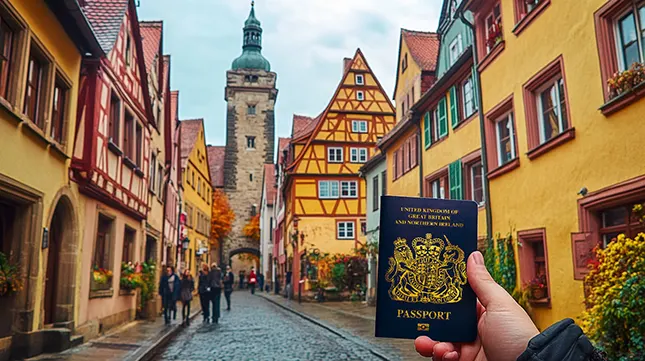Thinking about starting a new life in Germany?
Every year, thousands of people from around the world are drawn to this dynamic European country, and for good reason. With its high standard of living, robust economy, exceptional healthcare, and picturesque cities, Germany offers a unique blend of opportunity and charm that’s hard to beat.
Whether you’re looking for career growth, a family friendly environment, or simply a change of scenery, Germany ticks all the boxes. Plus, it is just a short hop back to the UK!
It’s home to some of Europe’s most vibrant urban centres like Berlin, Munich, and Hamburg, each with its own distinctive personality. Beyond the city lights, the country boasts stunning countryside, medieval villages, and the fairytale castles of Bavaria.
Germany also stands out for its impressive infrastructure. From efficient public transport to world-renowned universities, life here tends to run like clockwork.
Add in generous employee rights, strong environmental values, and a thriving cultural scene, and you’ve got a recipe for an extremely attractive new home.
The good news? Germany is actively seeking skilled professionals, students, and entrepreneurs to join its workforce and communities. If you’re ready to embrace a new chapter filled with opportunities, traditions, and bratwurst, Germany might just be your perfect fit.
In this guide, we’ll walk you through everything you need to know before relocating, from visas and housing to work and social life, so you can make the move with confidence.
Sorting Out Your Visa and Residency

Before packing your bags, you will need to get to grips with the visa and residency requirements for living in Germany.
The rules vary depending on your nationality and your reason for moving, whether it’s for work, study, or family reunification.
If you’re from the EU or EEA, the process is relatively simple. You don’t need a visa to enter or live in Germany, but you should register with your local residents’ office within two weeks of arrival.
For those from non, EU countries, including the UK post, Brexit, you’ll likely need a visa before you arrive. This could be a Job Seeker Visa, Blue Card (for highly qualified professionals), or a family reunion visa, among others.
Once in Germany, you’ll need to apply for a residence permit, Aufenthaltstitel, through your local Ausländerbehörde (foreigners’ office).
The paperwork can be time-consuming, so it’s a good idea to prepare all your documents in advance, including proof of accommodation, health insurance, and financial stability.
Germany is known for its bureaucracy, so expect to book appointments in advance and follow up diligently. It can feel overwhelming, but don’t be discouraged, once the formalities are sorted, you’ll be able to focus on settling in and enjoying your new life.
For up-to-date information and visa types, check the official German government portal.
Finding a Place to Live

Germany offers a wide variety of living options, from lively apartments in Berlin’s Kreuzberg district to peaceful homes in rural Bavaria.
Most newcomers initially rent, and renting in Germany is common and well-regulated. In fact, like many European countries, over half the population chooses to rent long-term.
Popular websites like ImmoScout24 or WG-GESUCHT are great places to start when searching for accommodation.
Remember that competition for housing in major cities like Munich or Hamburg can be fierce, so it’s best to start your search early and be prepared with all necessary documents, including proof of income and a Schufa credit report.
Rental contracts usually require a three-month deposit and a long-term commitment.
Apartments often come unfurnished, sometimes without light fixtures or kitchen units, so factor in the cost of furnishing your new home.
City life offers convenience and a vibrant culture, while rural living can provide tranquillity and lower rent. Popular expat hubs include Berlin for its creative scene, Frankfurt for finance professionals and Düsseldorf for its international business ties.
Registering your address (Anmeldung) at your local town hall is mandatory and forms the basis for almost everything else, from opening a bank account to setting up internet services.
Cost of Living in Germany

Germany is known for offering excellent quality of life at a relatively affordable cost, especially compared to cities like London, Paris, or Amsterdam. However, your expenses will vary depending on where you live.
On average, a single person might spend €900–€1,200 (£753-£1,003) per month, excluding rent.
Rent can vary significantly: a one-bedroom flat in Berlin might cost €1,200 (£1003) per month, while in smaller cities like Leipzig, you could pay half that. Utilities (heating, electricity, water) add another €200–€300 (£167-£250) monthly.
Groceries are affordable, especially at discount chains like Lidl, Aldi, and Rewe.
Dining out ranges from €10 (£8.36) for a casual lunch to €50+ (£42) for a fancy dinner.
Public transport is super-efficient and reasonably priced. A monthly transport pass in most cities costs around €48 (£41) with the Deutschlandticket, which covers regional trains and buses nationwide.
Healthcare insurance is mandatory and takes around 14–15% of your income, but the system is efficient and well-regarded. If you’re employed, your contributions are usually split with your employer.
For more helpful insights about what things cost in Germany, visit the Numbeo website.
Overall, Germany offers a balance of affordability, infrastructure, and value for money, making it an appealing choice for expats who want a high standard of living without breaking the bank.
Healthcare in Germany: What You Need to Know

Germany’s healthcare system is among the best in the world. It is efficient, high-quality, and accessible to all residents.
It operates on a dual system: gesetzliche Krankenversicherung (public health insurance) and private Krankenversicherung (private health insurance).
If you’re employed and earning under a certain threshold (€69,300 annually in 2025), you’ll be automatically enrolled in public insurance, typically with providers like TK (Techniker Krankenkasse) or AOK.
Contributions are split between you and your employer. Public insurance covers general practitioners, specialists, hospital care, and many medications.
Higher earners and self-employed individuals can opt for private insurance, which often provides quicker access to specialists and more flexible coverage. However, once you go private, it’s hard to switch back.
To register with a doctor, you’ll need your insurance card. While English, speaking doctors exist, they’re more common in major cities, so it helps to learn basic medical vocabulary.
Emergencies are handled efficiently, and you can call 112 for an ambulance. Pharmacies (Apotheken) are everywhere and offer over-the-counter advice, though many medications still require a prescription.
Overall, as long as you’re insured, a legal requirement, you’ll be well taken care of in Germany’s healthcare system.
Opening a Bank Account and Managing Money

Setting up a German bank account is one of the first things you’ll need to do after arrival; it’s required to receive your salary, pay rent, and set up utilities.
Most Germans use a Girokonto (current account), and opening one is relatively straightforward, though you’ll need to bring ID, proof of address (Anmeldung), and often a residence permit.
Popular banks include Deutsche Bank, Commerzbank, Sparkasse, and online options like N26 or DKB.
If you prefer English, language support and easy mobile access, digital banks like N26 or Wise are a great starting point.
Germany is still surprisingly reliant on cash. While card usage is increasing, especially in big cities, many smaller shops and restaurants only accept EC,Karte (German debit card) or cash. It’s wise to always carry a bit of money with you.
Paying bills often involves setting up automatic transfers (Dauerauftrag) or direct debits (Lastschriftverfahren).
Keep an eye on your monthly statements. Germany is known for its detailed paperwork and strict payment punctuality.
If you plan to stay long-term, you may also want to build a good Schufa (credit score), which is used for renting apartments and signing contracts.
Managing your finances well will help you settle into daily life with ease.
Working in Germany: Jobs and Salaries

Germany has a strong, stable economy and a shortage of skilled professionals in areas like engineering, IT, healthcare, and trades, making it a promising destination for career-minded expats.
Check out what jobs are most in demand in Germany in 2025.
If you’re from outside the EU, you’ll need a work visa or an EU Blue Card to take up employment legally.
Job seekers can start their search via sites like Stepstone, Bundesagentur, or Linkedin.
A professional CV and cover letter tailored to the German market is crucial.
The work culture here values punctuality, organisation, and a clear division between work and personal life.
The typical work week is 35–40 hours, and overtime is rarely encouraged. Employees enjoy generous benefits, including at least 20 days of paid holiday (most companies offer more), public holidays, and comprehensive healthcare.
Salaries are competitive and usually paid monthly. Income tax and contributions to health insurance, pension, and unemployment insurance are deducted at source.
If you’re self-employed, you’ll need to file taxes independently and secure your own health coverage.
Fluency in German isn’t always required, especially in tech, but learning the language will significantly increase your job options and integration into workplace culture.
Learning the Language
While many Germans speak excellent English, especially in big cities or international companies, knowing the language is a game changer when it comes to settling in.
From reading official documents to chatting with your neighbours, learning German makes everyday life smoother and more rewarding.
There are countless ways to learn: formal classes, online platforms like Duolingo or Babbel, private tutors, and community courses offered by local Volkshochschulen (adult education centres).
These government-subsidised classes are affordable and widely available, making them an excellent option for newcomers.
For work or residency purposes, you may be required to pass a basic German language test (usually A1 or B1 level on the CEFR scale), particularly if you’re applying for permanent residency or citizenship later on.
Practice makes perfect, try speaking at the supermarket, listening to German radio, or watching local TV with subtitles.
Germans generally appreciate when foreigners try to learn their language, even if they make mistakes.
If you’re relocating as a family, many schools offer language support for children, and young learners often pick it up quickly.
Embracing the language boosts your confidence and opens the door to more profound cultural experiences and meaningful connections.
Education in Germany

Germany’s education system is well regarded worldwide for its structure, quality, and accessibility. It offers free public schooling and affordable higher education, even for international students.
Children start primary school (Grundschule) at age 6. After four years, they move into secondary school, which is divided into several tracks based on academic performance: Hauptschule, Realschule, Gymnasium, or Gesamtschule.
Gymnasium prepares students for university, while the other tracks lead to vocational training or apprenticeships.
International schools are available in most large cities and are ideal for expat families who want continuity with their home country’s curriculum.
Popular choices include the International School of Berlin or Munich International School. These schools charge fees but often offer English language instruction and globally recognised qualifications like the IB Diploma.
For a list of the 20 best international schools in Germany,visit the International Schools Database.
If you plan to enrol your child in a local school, you must register with your local education authority and provide vaccination records, birth certificates, and proof of residence.
Germany also excels in higher education. Unlike the UK, public universities charge very low tuition fees, even for foreign students.
Institutions like LMU Munich or Heidelberg University consistently rank among the world’s best.
Education in Germany is structured, opportunity, rich, and designed to give every child the tools for success.
Embracing German Culture and Lifestyle

Germany offers a rich cultural tapestry shaped by centuries of history, regional diversity, and modern innovation. From world-class museums and classical music to lively festivals and buzzing nightlife, there’s something for everyone to enjoy.
Social etiquette plays a vital role in everyday life.
Germans are known for their direct communication style, punctuality, and respect for privacy.
While it may seem reserved at first, once you break the ice, friendships tend to be genuine and long-lasting.
Public holidays vary by region, but national celebrations like Tag der Deutschen Einheit (German Unity Day) and Oktoberfest are widely celebrated.
Christmas markets, beer festivals, and regional carnivals (especially in Cologne and Mainz) offer colourful glimpses into local traditions.
Sundays in Germany are noticeably quiet.
Most shops are closed, and the day is reserved for rest or family.
It’s an excellent opportunity to explore local parks, go hiking, or enjoy a leisurely brunch.
Food is another big part of German culture, from hearty sausages and Sauerbraten to global cuisine in cosmopolitan cities. And don’t forget the beer: Germany is home to over 1,500 breweries!
Whether you’re into history, the arts, nature, or food, integrating into German culture is both rewarding and enriching and a big part of making your new life here feel like home.
Getting Around: Public Transport and Driving

Germany’s transport system is one of the best in Europe, efficient, reliable, and pleasingly affordable.
Cities are well connected by trains, trams, buses, and the famous Autobahn network. If you don’t drive, you’ll still find it easy to get around.
Urban areas benefit from excellent public transport.
Major cities like Berlin, Munich, and Frankfurt have comprehensive networks of U,Bahn (subway), S,Bahn (suburban trains), trams, and buses.
The nationwide Deutschlandticket €48 (£41)gives you unlimited access to regional and local transport, perfect for commuters and explorers alike.
Long-distance travel is easy via Deutsche Bahn’s high-speed ICE trains.
You can travel from Berlin to Munich in under four hours, making weekend getaways a breeze.
For budget-friendly options, buses like FlixBus or car-sharing platforms like BlaBlaCar are also popular.
Driving in Germany is straightforward once you get the hang of the road signs.
Your driving licence is valid if you’re from the EU or EEA. After six months, non-EU residents may need to exchange it for a German one.
Cycling is another fantastic way to explore, and many cities have dedicated bike lanes and cycle-friendly infrastructure in place.
Whether you’re on two wheels or riding the rails, getting around Germany is practical, green, and often scenic.
Taxes and Social Security
Germany’s social security and tax system might seem daunting initially, but it’s designed to support you in the long run.
If you’re employed, your contributions are automatically deducted from your gross salary, covering healthcare, pensions, unemployment insurance, and more.
Income tax rates are progressive, ranging from 0% to 45%, depending on your earnings.
Most workers fall into tax classes (Steuerklassen), which are determined by marital status and dependents. Your employer will deduct income tax at source, and you’ll receive a payslip outlining your contributions.
You may be required or encouraged to file a tax return (Steuererklärung) each year to claim possible deductions and refunds. The process can be complex, so many expats use tax apps like SteuerGo or hire a tax advisor (Steuerberater).
Germany’s social safety net is extensive. You’re entitled to unemployment benefits if you’ve contributed long enough, and the pension scheme is one of Europe’s most stable.
Families benefit from child allowances (Kindergeld), and parental leave is generous.
Understanding how taxes and social contributions work is key to planning your finances and making the most of the support Germany offers to residents and workers.
Bringing Pets and Possessions to Germany

Moving to Germany with pets or household goods requires a bit of planning but is certainly manageable.
Germany is very pet-friendly, with many green spaces, walking trails, and animal-friendly accommodations.
If you’re bringing a dog, cat, or ferret from another EU country, you’ll need a valid pet passport, microchip, and up-to-date rabies vaccination.
Check with your local German embassy about quarantine rules and import restrictions for non-EU moves.
Once you arrive, dogs must be registered with your local authority and insured with liability coverage (Hundehaftpflichtversicherung). Some states also require dog training certificates or breed-specific permits.
For an easy to use step-by-step guide to moving to Germany with pets visit Simple Germany and the UK Governments guide to taking pets abroad..
Making Friends and Building a Social Life

Moving to a new country can feel isolating at first and you will feel homesick but, Germany offers plenty of opportunities to build a strong social network.
While Germans may seem reserved initially, they’re warm, loyal friends once the ice is broken.
Joining clubs and societies, known as Vereine, is one of the best ways to meet people. Whether it’s hiking, choir singing, yoga, or football, there’s a Verein for almost every hobby.
These clubs are deeply ingrained in German culture and often welcome newcomers enthusiastically.
Language exchange groups, international meetups, and community events can also help you connect.
Apps like Meetup, Facebook groups for expats, and local noticeboards are full of events aimed at English speakers and new arrivals.
If you’re moving with children, school activities and parent groups offer great opportunities to make friends with fellow families.
And don’t underestimate your neighbours, a friendly “Hello” can go a long way toward feeling more at home.
While building a new social circle takes time and effort, putting yourself out there will lead to meaningful connections that make your life in Germany richer and more fulfilling.
Transporting your Personal Effects

Relocating to Germany is a big step and having the right removals partner can make all the difference.
With decades of experience in European removals, Barnes of Lincoln offers a smooth, stress-free moving experience tailored to your individual needs.
Shipping personal belongings to Germany is not quite as straightforward as it used to be since the UK left the European Union.
There is more official paperwork than there used to be. However, with an experience shipper such as Barnes of Lincoln it need not be complicated. We can handle logistics, customs paperwork, and door-to-door delivery.
Renting a furnished flat can ease the transition, but if you are bringing all of your furniture, be aware that German apartments often don’t include kitchens or light fixtures.
Consider using temporary storage with us while you get settled.
Call us today on 01522 254262 for a free quote. Barnes of Lincoln, your trusted partner for a seamless move to Germany.
Your personal possessions are a big part of feeling at home and, with the right preparation, you’ll be reunited with them on German soil in no time.




